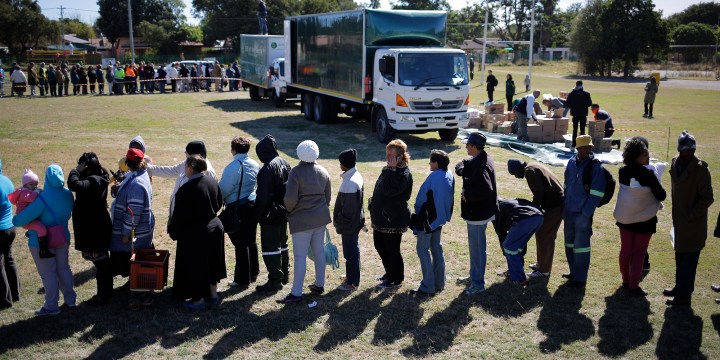PHILANTHROPY
Inequality is the biggest threat to SA, say philanthropists

The word ‘philanthropy’ often conjures up images of high-profile billionaires such as Oprah and Bill Gates, but a network of ‘givers’ exists here in South Africa, donating to various causes such as education and health to help fight injustice and inequality. Ironically, philanthropy may just be a symbol of inequality, the very thing it’s trying to eradicate.
The Independent Philanthropy Association of South Africa (IPASA), launched its Annual Review of South African philanthropy during a two-day symposium at Stellenbosch University from 28 to 29 October 2019.
The review was aimed at highlighting the work and nature of philanthropy which is seldom discussed in depth. Philanthropic funds are often “private money” and accessing this financial data can prove difficult.
It discussed the shift in philanthropy from charitable giving towards having a more strategic approach.
“Few philanthropists now adopt a mere ‘cheque-writing’ approach to giving,” wrote Sarah Rennie, who chairs the IPASA council and the Grindrod Family Centenary Trust. They increasingly rely on experts, researchers, evaluators and other professionals to help steer their investments to achieve the greatest impact.
IPASA’s membership network includes big players such as Standard Bank, Rand Merchant Bank, the Ackerman Family Foundation and the Oppenheimer Memorial Trust.
The review pulled data from several recent reports. The Nedbank Private Wealth’s 2016 Giving Report found there were more than 100,000 high-net-worth individuals in SA in 2015 (namely those who earn at least R1.5-million a year or own investable assets of more than R5-million, excluding their primary residence). Of that number close to 90% donated their time, money or goods that year towards projects and entities such as social and community development, religious institutions, with a small number of donations going to advocacy groups and political parties.
The Charities Aid Foundation’s 2018 World Giving Index found that South Africa ranked 40th in the world for its philanthropic efforts.
Other studies showed that a group of 11 South African universities received a combined amount of close to R2-billion in donations in 2017 of which private philanthropy contributed more than R1-billion.
Yet, in recent years, the idea of “philanthropy” has come under scrutiny. The book Winners Take All: The Elite Charade of Changing the World by American author Anand Giridharadas argues that elites, who comprise 10% of humanity yet hold 90% of the planet’s wealth, have an undemocratic approach towards fighting inequality and justice, treating it like a business endeavour and ignoring the direct impact on people’s lives.
Lindy Rodwell van Hasselt (relationship director at the Lewis Foundation) writes in a review of the book that this methodology “preserves the status quo, rather than pushing for systemic change which may threaten the social order and the positions of the privileged”.
This stark inequality is nothing new to South Africa.
The conference, themed as “Social Cohesion: towards building trust and hope”, focused on how philanthropy can foster unity in South Africa.
It brought together stakeholders from private, public and academic spheres.
Former public protector Professor Thuli Madonsela, who delivered the closing address, said the core of social cohesion is “living together harmoniously”, but inequality is the biggest threat to social harmony.
“We stay together, but we don’t really live together,” said Madonsela, who is now the chair of social justice at the Stellenbosch Law Faculty.
She referred to how many young people view poverty as the new apartheid and are now “opting out of democracy” because the democratic project did not ensure that all citizens were truly “free”.
Professor Murray Leibbrandt, director of the Southern Africa Labour and Development Research Unit at the University of Cape Town, presented research showing the prevalence of intergenerational poverty in South Africa.
“If you’re in the bottom 5%, the chances of your children ending up there is 95%,” he said.
He told Daily Maverick that “inequality seeps into the fabric of society” explaining that it’s a threat to social cohesion because inequality isn’t just about how much you earn or where you live, but how that impacts on your confidence.
“People don’t get affirmed.”
During a panel discussion between Roelf Meyer, Rekgotsofetse Chikane and Lovelyn Nwadeyi, Chikane, an activist and author of Breaking a Rainbow, Building a nation: The Politics Behind the #MustFall Movements, felt the term “born-free” should be replaced, as those born in poverty are likely to die impoverished.
Meyer, who played a key role in negotiations to end apartheid, felt that since 1994, several mistakes had been made resulting in a failing education system, slow land reform, a BEE system that benefits only a few elites, and an economic model that doesn’t work in democratic South Africa.
Activist and founder of L&N Advisors, Nwadeyi pointed out the inequality represented by philanthropy.
“At the core of these organisations is the idea that it’s okay to have one group that amasses wealth. There is a level of greed,” she said, though she believed that equality was possible in South Africa as unequal systems were man-made and could be reversed. DM

















 Become an Insider
Become an Insider